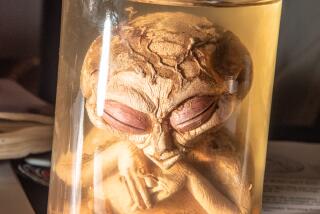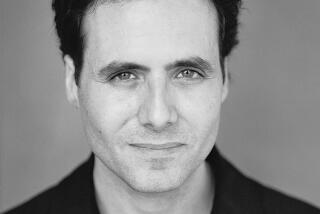The Magician and the Prophet : THE MASK OF NOSTRADAMUS <i> by James Randi (Charles Scribner’s Sons: $19.95; 320 pp., illustrated; 0-684-19056-7) </i>
- Share via
The printing press was barely 33 years old when Michel de Notredame (Nostradamus) was born in Provence. In 1503, the new technology already was bringing authors to celebrity and wealth as it penetrated middle- and upper-class society.
In 1550, Nostradamus began issuing his annual astrological almanacs, launching a career that would guarantee his place in history. Five years later, the first edition of his most famous work, the “Centuries,” appeared.
Each “Century” was a volume of 100 prophetic verses, or quatrains, cloaked in obscure references and open to many interpretations. So popular were his prophecies that Catherine de Medicis, the queen of France, summoned Nostradamus for a royal audience. Already a physician widely noted for his ability to treat the plague, Nostradamus thus achieved the status of medieval “superstar.”
To this day, the “Centuries” of Nostradamus have remained in print in one form or another. Frequently embellished with interpretations or attacks intended to prove or disprove his prophetic powers, his writings have spawned an entire literature with its own 400-year history.
Few, if any, of the commentators can claim to have been impartial. In fact, not a few were deliberately bending the prophet’s words to suit their particular political ends.
During World War II, British Intelligence distributed thousands of copies of “improved” Nostradamus quatrains throughout Europe in a “black” operation designed to suggest that Nostradamus actually had predicted the fate of Hitler.
To this dubious literature must now be added James Randi’s new book, “The Mask of Nostradamus.” A professional magician and recipient of the MacArthur Foundation’s “genius” award, Randi is active in a movement of academics and scientists who speak out against the paranormal at every possible opportunity.
Although this book is subtitled “A Biography of the World’s Most Famous Prophet,” its short biographical sections are scattered between large sections in which Randi launches attacks on Jeane Dixon, card sharks, modern astrology and “Nostradamians.”
By turns a biography, an overview of 16th-Century science and society, a debunker’s guide to the techniques employed by false prophets, and a fresh analysis of some quatrains, the tone of the book varies wildly.
Randi’s style is a curious amalgam of romantic musings--”Unsolved puzzles and unanswered questions, order among chaos and ripples in the fabric of the universe are all matters to ponder”--and awkward passages: “Implacable authorities can often be placated.”
Though his research eventually led him to respect Nostradamus for his “worth as a physician and as a poet, his perserverance and courage,” Randi goes beyond laying out the evidence and frequently makes disparaging and manipulative comments that demean the reader.
In his eagerness to put down anyone--past or present--who does not share his materialistic viewpoint, he casually lumps Nostradamus and Paracelsus (an important figure in the history of medicine) together with Rasputin and Cagliostro as “charlatans of note.”
Despite his distaste for the occult, Randi suggests that the good doctor was an intelligent man swept up by the popular success of his almanacs, forced to play out the role of seer for his public.
Randi has been making things disappear for his entire career, both as a stage magician and a professional debunker. Unfortunately for his credibility, in digressing repeatedly into attacks on astrology he also makes important parts of the story conveniently disappear.
Since the mid-’70s, Randi has been involved with an organization of debunkers called the Committee for the Scientific Investigation of Claims of the Paranormal (CSICOP). With strong contacts throughout the media and academia, CSICOP has been in a position to manipulate coverage of experiments in the paranormal. (Several of CSICOP’s founding members were performing magicians.)
Believing that to disprove astrology might be to rescue consumers from surrendering “individual control of their destiny” to the occult, Randi and his colleagues took aim at the most extensive and scientific evidence available for planetary influence in human behavior, a massive statistical experiment performed by the French psychologists Michel and Francoise Gauguelin.
While the Gauguelins’ results argue for a statistical correlation between the position of some planets at birth and the profession later taken up by the individual, they do not support modern astrological methods.
Presuming that it would be an easy matter to disprove the results (and possibly even expose the Gauguelins as merely another couple of charlatans), Randi and his colleagues participated in several major replications of the experiments, with positive results.
Faced with the horrible prospect that they had, in fact, strengthened the case for what was called “the Mars effect,” they could not deny the results. But they could make them disappear.
As a result of this deception, several founding members, including astronomer Dennis Rawlins and the late psychologist Richard Kammann, departed in protest. Rawlins later published a pamphlet on the results of the CSICOP experiments entitled “Star Baby.” Very recently, the Gauguelin results received yet another independent confirmation by Prof. S. Ertel of Germany.
Randi chooses to ignore these events, with which he was closely associated, and he continues to appear in print and in interviews, acting as if he and his colleagues were not caught suppressing uncomfortable research results while waving the banner of impartial scientific investigation.
Given the huge emphasis Randi places upon debunking astrology in a volume misleadingly (and inaccurately) subtitled “The First Biography of Nostradamus,” this omission is unacceptable.
Randi reveals himself as neither a scholar nor a reliable critic, but as a tub-thumper. Only those who already agree with his conclusions will enjoy the tune he bangs out.
Poor Michel de Notredame! He failed to predict how long it would be before a talented historian might provide us with the facts, all the facts, and only the facts.
More to Read
Sign up for our Book Club newsletter
Get the latest news, events and more from the Los Angeles Times Book Club, and help us get L.A. reading and talking.
You may occasionally receive promotional content from the Los Angeles Times.









